Arsenal Women assistant coach Aaron D’Antino worked with the likes of Ange Postecoglou and Kevin Muscat at Melbourne Victory. The Australian speaks to KEEPUP’s Sacha Pisani about the journey to the United Kingdom with Joe Montemurro and his ongoing learning process.
It’s not every day that you land your first full-time coaching role at a football powerhouse, but that’s the story of Aaron D’Antino and Arsenal.
D’Antino has had to “pinch himself” at times. He was working as an assistant at hometown club Geelong SC in the Victorian state leagues while juggling his Melbourne Victory commitments when Arsenal came calling four years ago.
He followed fellow Australian Joe Montemurro to Arsenal as his senior assistant in a dream move to the London back in 2018 and the leap to Europe paid instant dividends – the Gunners ended their Women’s Super League title drought that same season.
Four years on and D’Antino is still working as an assistant at Arsenal, albeit now with Swedish boss Jonas Eidevall, while forming an Aussie quartet alongside Matildas stars Steph Catley, Caitlin Foord and Lydia Williams.
Speaking to KEEPUP, D’Antino said: “It’s incredible. To be honest, I was blessed to work in the environment at Victory but to come here, it’s one of things you kind of dream of.
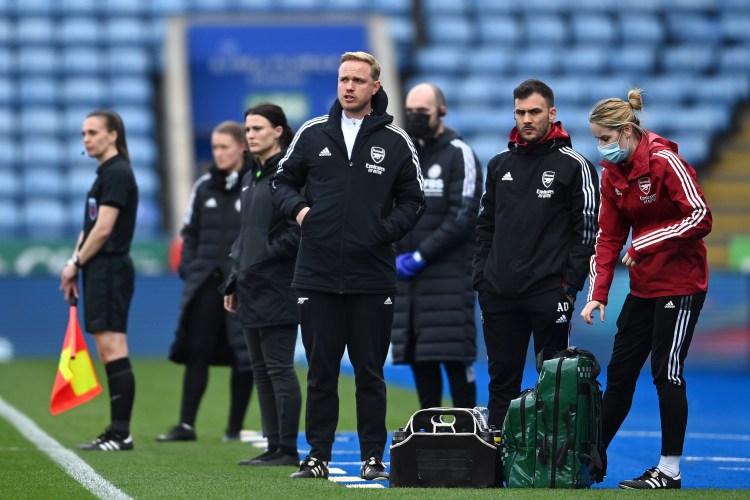
“I had a mate of mine who was a mad Arsenal fan growing up. You watch a lot of it when you’re younger. I came overseas in 2008 and watched one Premier League game. It’s all that kind of stuff where you dream about it, think about it.
“To arrive day one and all of a sudden you’re at Arsenal’s training facility. This was when Unai Emery just started and Arsene Wenger had finished. You think about the history. You’re in awe of it straight away.
“The facilities, the size of it, the pitches. You feel like you’re in dreamland for that first period and I still do now but you quickly realise you’re there to do a job.
“With the women’s team in terms of European and English football, you realise the size of the club and reach it has. You take on that responsibility. It’s a privilege everyday to rock up at those gates and work there.”
Making the move to Arsenal
It’s a scenario Montemurro and D’Antino joked about in the tunnel at AAMI Park years ago – working together.
Montemurro was head coach of Victory Women’s team, and D’Antino was involved across the youth and senior sides while also working as Dom Barber’s assistant at Geelong SC.
Aside from being his coach educator during his AFC C course, D’Antino didn’t have a lot to do with Montemurro at the time. However, the stars aligned in 2018.
Montemurro was looking for an assistant after he was headhunted by Arsenal following his work at Melbourne City, where he delivered two A-League Women Championships.
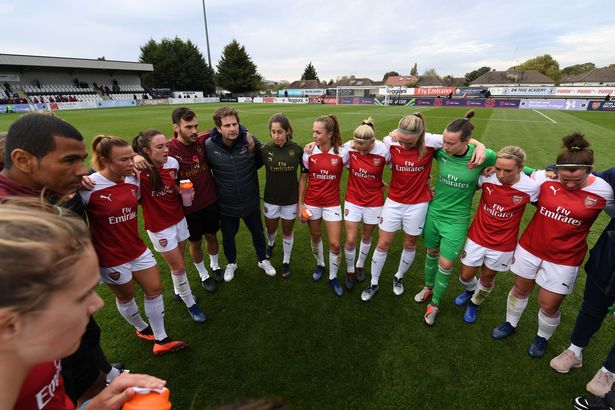
“When my mum encouraged me to go through the application process, I thought why not I had nothing to lose,” D’Antino, who is poised to complete his UEFA A license, said. “I reached out to him and that’s when the conversation started then I interviewed etc.
“When they offered me the job, I remember getting off the phone and calling my parents, calling JP [Jean-Paul de Marigny] and [Anthony] Crea, I don’t know what to do. It was a real pinch yourself moment. Then it was a lot of toing and throwing.
“I was going around holidaying in between seasons with mates, I was at the back of the plane by myself and I was thinking. The big thing for me came back to my family’s story – grandparents migrating to Australia and the whole idea of them jumping on a boat to get here and no ability to pick up a phone or facetime home.
“So I was just standing there thinking if I don’t take this opportunity up, I would be absolutely mad when I think about what they had to do to seek out opportunities. Haven’t looked back since. Best decision I could’ve made.”
“It was a real quick and steep learning process for me in terms of going from an analyst to coach. at Victory, I just really answered to Kev and the coaches and occasionally did stuff with players,” he added.
“Where immediately you go from behind the laptop to being on the pitch. Trying to educate, develop and grow 23 elite professional players. That learning process was very fast.
“I understood bits and pieces of the women’s game, but to come over here and get first-hand experience of the level, it’s incredible. There’s no difference between men’s and women’s football, and there’s not.
“If anything, I’d almost say from a coaching perspective, it’s actually harder coaching females just because of their level of curiosity and their desire to understand things, and take ownership for it.
“It’s amazing. The amount they challenge me everyday, I’ve just got to soak it up because I don’t know how long it will last.”
Arsenal had gone seven years before Montemurro and D’Antino teamed up to help the Gunners end their WSL wait in 2018-19.
D’Antino and Montemurro worked together until 2021, when the latter stepped down and eventually took charge of Juventus Women in Italy.
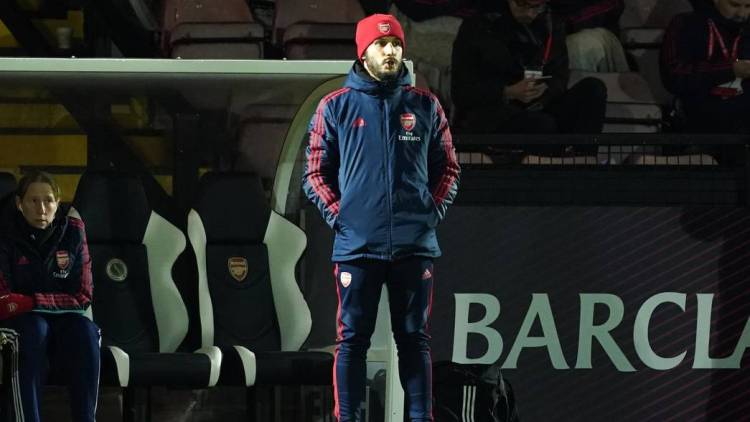
D’Antino added: “For me to land my first full-time professional coaching job over here at Arsenal, I pinch myself all the time.
“I reflect on my time I put in Australia, I loved it . Pep [Montemurro] took a huge gamble on bringing me over. I hadn’t coached at any great level, when I took about the elite level over here. But what I did have was a skillset in a number of areas – sport science, analysis, some coaching etc.
“All of that comes back to working at the elite level back home. Like Pete said to me, I won’t realise the value of who I was working with until later but I’ve realised that now.”
Let’s go back to the start
A second-generation Italian, there was always a connection to football, but in D’Antino’s words, he was never a “purist” growing up.
“I don’t have those memories of getting up at all hours with my dad or uncle [to watch football],” he said.
In fact, D’Antino didn’t get into football until late. A “massive basketball fan” growing up, it wasn’t until the age of 14 that he swapped the five-a-side sport for the 11-a-side game.
“I had a cousin that was playing football and asked me to join in and help out because they were low on numbers,” he recalled.
“I had a cousin who travelled over from Switzerland, bought us our first football jerseys. He bought as a [Paolo] Maldini, [Gabriel] Batistuta and [Alessandro] Del Piero top and I had no idea who these people were but because of him I always had a bit of an interest in football.
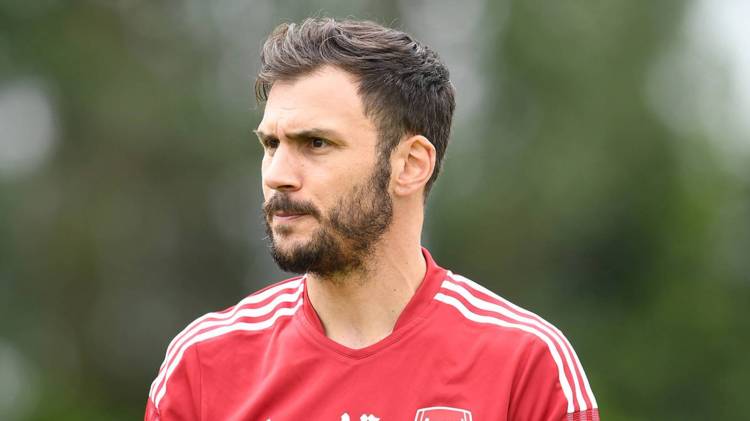
“I went to my first training session and basically quit basketball the next day.”
The rest is history.
D’Antino went on to play state-league football in Victoria – North Geelong Warriors, Clifton Hill and Altona City among the teams. But a Victorian camp piqued his interest in sports science.
“They were showing a video on sport science – on David Beckham’s free-kicks in a biomechanics lab – and that’s what generated the interest,” he said.
“Got into sport science – degree and then personal training.”
Working at Melbourne Victory
Through his Victoria University studies, he landed a sports science internship at A-Leagues club Melbourne Victory in 2011.
D’Antino was at Victory when Mehmet Durakovic was in charge before the former Socceroo was replaced by ex-Ipswich Town and Queens Park Rangers boss Jim Magilton in 2012.
Magilton’s interim reign yielded just two wins as Aussie trailblazer Ange Postecoglou and strength and conditioning coach Peter Cklamovski arrived in Melbourne at the end of the season.
It was Cklamovski, who took D’Antino under his wing.
“Two seasons with him – mirrored everything he did with the first team with the youth team,” D’Antino said. “I was working with the first team during the day and youth team in the afternoon/evening. That’s how I got the foot in the door.
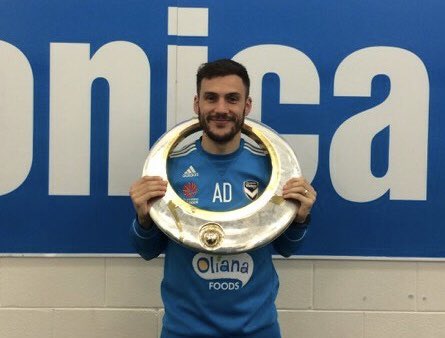
“When Kevin took over, I naturally progressed into the lead analyst role. I was doing it with the youth team and no one else really had the skillset in terms of using sports code and software. That’s when the interest to coach came about.
“I’ve done sport science and strength conditioning side of things. Doing analysis is really when my passion developed for the game because I thought I understood it but I really had no idea. I really started to look at the game as a game of chess.
“I started to understand the tactical battles going on within and that’s when I went, you know what, coaching seems the natural progression. I did analysis for a couple of years but that’s when i started doing coaching badges on the side because I missed being out on the pitch.”
During his time with the Victory, D’Antino was also honing his craft away from AAMI Park.
He was a player/assistant coach at Altona City, helping the club move up from State League Division 3 to State League Division 2.
“One of the best learning experiences ever. I was mad for doing it,” said D’Antino, who eventually went back to playing/assisting at Bell Park before working at Geelong SC.
“Working beyond full-time as an analyst during the day and then trying to coach at night but it was my first exposure to management.
“Even though it was amateur to football, the comparisons you can draw in terms of managing people, communication and education – it’s no different.
“The biggest thing I learnt there is I tried to take what I was doing at Victory and tried to apply it at state-league level. It was too much, I was too full on in terms of the detail I was trying to get the boys to play at.
“At the end of the day, they’re all amateur footballers who want to have a run around. It was an eye-opening experience.”
Falling in love with the game
“You will not realise how fortunate you’ve been to be in this environment until you’re older.”
Those were Cklamovski’s words and they have never been lost on D’Antino.
D’Antino was at Victory when they prised Postecoglou back to his hometown from Brisbane Roar in 2012.
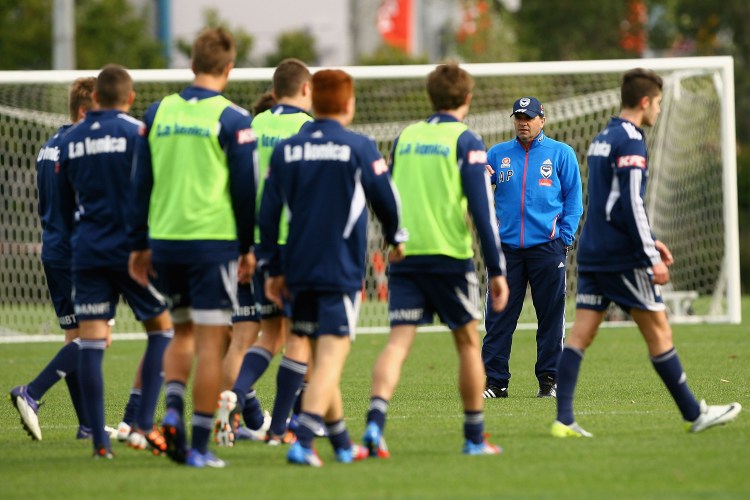
Inside the inner sanctum, D’Antino witnessed Postecoglou’s work firsthand alongside his trusted lieutenant Cklamovski.
It was a priceless learning experience.
“I understand what it takes to be successful because I’ve seen it,” he said. “It all started there [Victory].
“The belief they had in what they were doing was unparalleled. That transitioned into the way he was coaching. They were relentless in terms of detail, work ethic, standards.
“I look at that now and what he’s doing at Celtic and what he did with Yokohama and the national team, they’re fundamental values but they live it and breath it every single day. That was the biggest takeaway for me from working with them.
“That’s when tactically I fell in love with the game because I had no idea about the game. But sitting down with them, being in reviews. I just carried a notepad around with me 24/7 which is what I still do now. How detailed they were, process-orientated they were.
“It didn’t matter who you were playing, what level, the process was the same. It was relentless. When you look at the success they’re having, I look at it and say there’s no surprises there.
“They just do the basic things ever so well and they were very clear in how they wanted to play football.
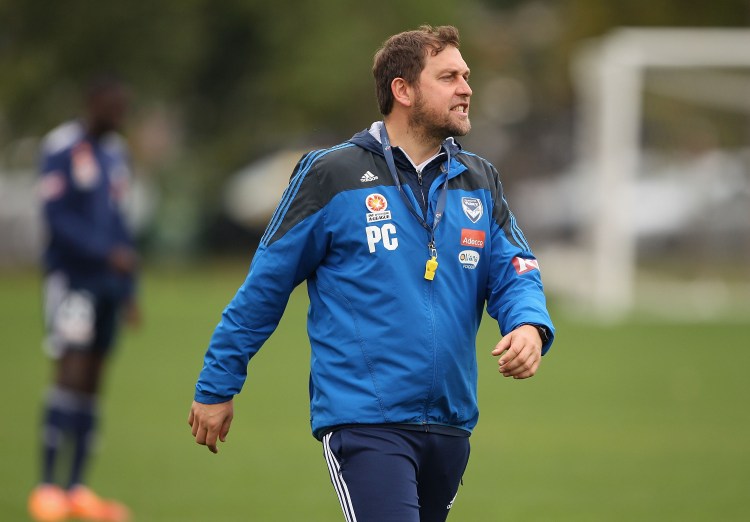
“The biggest takeaway for me particularly working with Pete, who took me under his wing from day one. Just the humility in terms of the type of person he was, the person Ange was.
“I kind of had this idea of people at the elite level, just worrying about themselves but I remember the first day I met Pete.
“We clicked straight away. The time he gave me, understanding when to give me space to try and do my thing, to learn and fail, develop and grow. But every single day, arm around the shoulder.”
And the learnings continued post-Postecoglou as Victory won two A-League Men Championships, a Premiership and Australia Cup under former assistant and club legend Kevin Muscat.
“That transitioned into how we worked, it transitioned into the time with Kev. The principals were the same and we had a lot of success,” he added.
Falling agonisingly short to Kerr’s Chelsea
D’Antino’s Arsenal painstakingly missed out on the WSL title by a solitary point on the final day last season.
Arsenal huffed and puffed in an incredible season which saw them pipped to the post by defending champions Chelsea and superstar Matildas captain Sam Kerr.
The Gunners, with Catley, Foord and Williams in the thick of the action, also reached the FA Cup semi-finals, having featured in the Women’s Champions League and League Cup quarter-finals.
“I remember getting to May, you’re coming back to Champions League quarter-final against Wolfsburg, FA Cup semi-final against Chelsea and you have a league to go and win,” D’Antino said. “That for me is real football and that was the best thing.
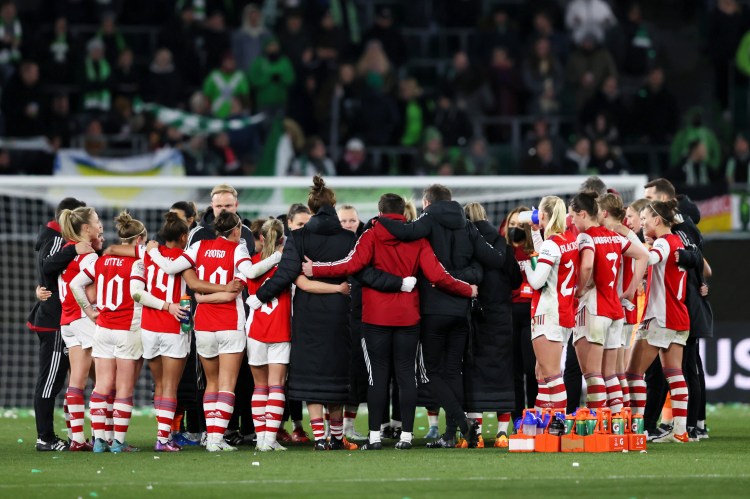
“Sitting in a position to be able to compete for some of the biggest trophies in women’s football. You’re absolutely gutted you don’t get anything at the end of the day, that’s football. Liverpool being able to get the quadruple and only ending up with the two. You have to be in a position to win these things.
“Sometimes you win, sometimes you don’t. Hopefully the learnings from last season and being close, then propels us onto bigger and better things.
“We took on a new manager, we moved in a lot of new players. A new methodology. There was so much growth and development as a team.
“To get as close as we did, we have to take pride in that. There’s only a few clubs in the world at elite level are privileged enough to compete for those things. That’s the bitter sweet part of it. Hopefully this season sets us up to be successful and go one step further.”
The future
D’Antino has had a taste of everything – sports science, analysis and coaching.
And coaching is where he wants to stay as the Aussie continues to make his mark on European football.
“My obsession or biggest enjoyment that I get now from a work perspective, is the whole tactical transition between watching a game, studying it, breaking it down, transitioning that into a practice, going onto a pitch and trying to implement it then develop that way.
“That’s what I love. That’s the biggest part of my development because I came from a heavy analysis background. Even when I was employed under Montemurro, it was because I had the analysis skillset. We didn’t have an analyst at the time.
“We’re about to employ a lead analyst now to try and alleviate me of a lot of my analysis responsibility so I can focus on coaching.
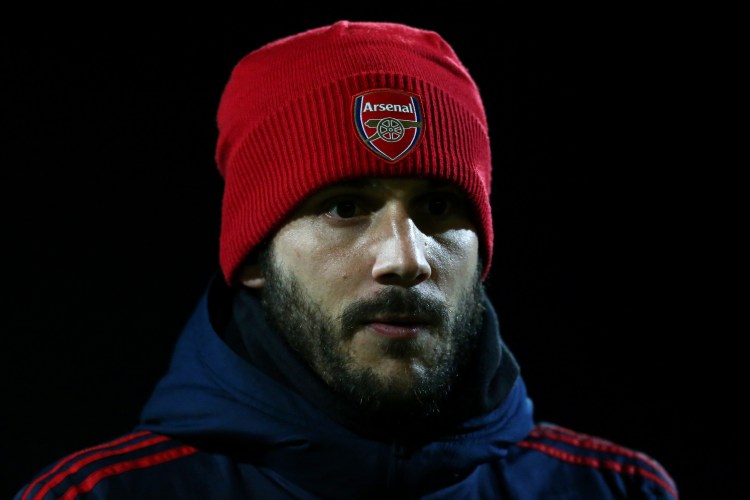
“Until I’m 100% confident and competent in being able to take all the session, like a first-team coach, until I’m at that point, I have no interest in being a manager. That’s the short term. Longer term, would I like to get in management? Absolutely.
“Once I feel I’m happy where I am as a coach, then I think challenge of trying to inspire, motivate, manage a group of people and trying to get people steering in the same direction to achieve something, I’d love that challenge from a leadership perspective.”





